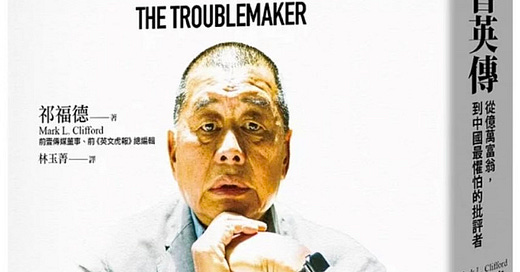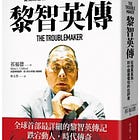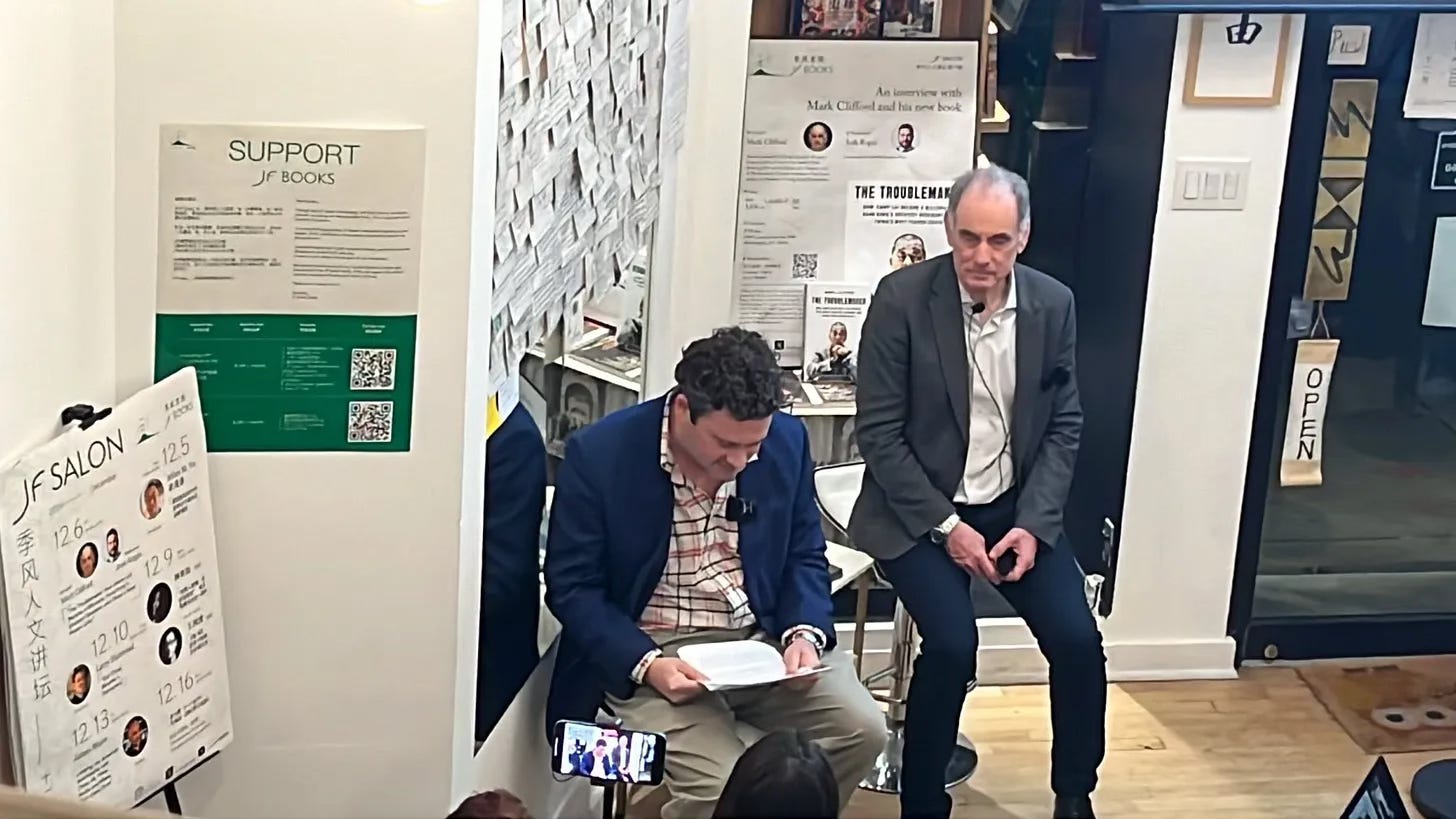訪談 | 祁福德: 黎智英沒有變,但香港變了(English attached)
編者按:THE TROUBLEMAKER: How Jimmy Lai Became a Billionaire, Hong Kong's Greatest Dissident, and China's Most Feared Critic (Simon & Schuster,2024) by Mark L. Clifford 於2024年11月出版。「這是一個非凡的人生故事——從貧窮到富有再到政治犯——為香港的民主鬥爭提供了啟發性的傳記。」《波士頓書評》曾與2024年11月採訪作者,問作者為何黎智英從成功的商人變成了囚犯。Mark L. Clifford回答說:黎智英沒有改變,改變的是香港。
2025年7月,這本書的中文版《黎智英傳:從億萬富翁,到中國最懼怕的批評者》在台灣出版,書評英文版基礎上刊發訪談中文版。訪談英文版 Interview | Mark L. Clifford: Jimmy hasn't changed. Hong Kong has changed.(2024年11月22日)
免費訂閱《波士頓書評》及相关事宜发送邮件:boshidunshuping@gmail.com,隨意打賞:Zelle,PayPal:boshidunshuping@gmail.com 用戶名:Boston Review of Books;長期支持請點擊下面訂閱。
祈福德(Mark L. Clifford)是香港自由委員會主席,曾任亞洲商業理事會執行主任,以及Next Digital董事會成員。他擔任《亞洲書評》的編輯主席,並曾任香港兩份英文報紙《標準報》和《南華早報》的總編輯。他是加州大學伯克利分校歷史學榮譽畢業生,哥倫比亞大學沃爾特·巴格霍特研究員,並擁有香港大學香港歷史博士學位。
Mark L. Clifford at JF bookstore,Dec.6, 2024
問:去年11月《黎智英傳:從億萬富翁,到中國最懼怕的批評者》英文版出版的時候我們做了一個訪談,8個月後,中文版出版。在今年2月路透社的採訪中,黎智英(Jimmy Lai)的兒子Sebastien Lai表示,由于糖尿病和长期单独监禁,其父亲的健康状况“正在恶化”,并称“他的时间不多了”,暗示了严重的健康问题。請問,黎智英和他的案件近況如何?
答:Jimmy案件結案陳詞將於8月14日開始,預計10月會有裁決。我們希望他能在那個時候獲釋。時間越來越緊迫。他已年近八旬,患有糖尿病,在獄中感染過新冠並接受了白內障手術。在被關押的1600多天裡,他大部分時間都被單獨監禁。我們只能希望中國領導層能意識到,繼續關押黎智英並不符合他們的利益。
問:黎智英是一位成功的商人。他的商業成功可以說是由香港成就的嗎?你認為香港有哪些特殊因素促成了他的商業成功?
答:黎智英的成功離不開香港這樣一個獨特的環境。香港獎勵敢於拼搏的創業家,青睞那些聰明、創意十足、靈活應變並能滿足客戶需求的個人。黎智英12歲時作為偷渡者來到香港,當時正值中國大陸因「大躍進」政策引發大饑荒,導致高達4500萬人死於人為饑荒的慘劇。黎智英逃離的是一個飢餓肆虐的中國,而他在香港尋求的是免於饑餓的自由以及通過自身努力謀生的自由。他常提到抵達香港的第一天早上,聞到粥、麵包和點心的香氣,感覺自己彷彿來到了應許之地。僅僅15年,他從睡在工廠地板上的童工成長為工廠老闆。這種免於饑荒、自由工作的環境,很快轉化為他創業的自由。香港賦予他多種形式的自由,特別是在1989年天安門事件後,他開始追求政治自由,創辦雜誌和報紙,並不斷創新新聞採集與傳播方式,從印刷到視頻,甚至計劃在台灣開展電視項目(雖因當地政治與商業阻力受挫)。當時的香港擁有全球最輕觸且高效的政府管理,低稅收、低監管,社會崇尚成功企業家。作為英國殖民地,香港雖無政治自由,但擁有黎智英所珍視的西方價值,尤其是法治。黎智英或許在任何有一定自由度並鼓勵創業的環境中都能成功,但他完美詮釋了那個時代香港的精髓。他被譽為「快時尚之父」,日本優衣庫創始人柳井正曾專程來香港向他學習。黎智英創辦的佐丹奴(Giordano)雖未進軍美國,但他對此感到遺憾,因為他熱衷於在全球最大、最具競爭力的市場競爭。香港是他的家,也是他致富的地方。
問:現在黎智英身陷囹圄,似乎成了國家的敵人。什麼改變使他從香港的成功人士變成了囚犯?
答:黎智英本人並未改變,改變的是香港和中國。在習近平領導下,中國對異見的打壓愈發嚴厲。香港從一個開放的國際都市,淪為一個壓制自由、無法容忍獨立媒體甚至任何形式異議的地方。人們因演唱《榮光歸香港》、對國歌不夠「尊敬」或穿著當局不喜歡的T恤而被捕。黎智英的信念未變,他依然相信免於饑荒、自由工作、創業、言論自由、從事新聞工作以及實踐信仰的自由。這些自由是1997年香港回歸前,中國共產黨在《中英聯合聲明》和《基本法》中承諾保障的。然而,這些承諾已被打破。黎智英未變,改變的是香港和中國,後者未能兌現對香港的承諾。
問:(2024年)11月20日,黎智英首次出庭作證,否認「港獨」並相信自己無罪。中國政府逮捕黎智英的「罪名」是什麼?你對這些「罪名」的看法?
答:黎智英的國家安全法審訊已持續超過一年,至2024年底休庭時已有113個開庭日。政府指控他「勾結外國勢力」,這是《香港國安法》下可判終身監禁的罪名,另有「煽動罪」指控。檢方的案件可笑至極,僅證明黎智英從事新聞工作。他公開批評香港和北京政府,這種言論受《基本法》保護,後者是中國頒布的香港小憲法,保障香港50年內的自由與生活方式不變。黎智英從未主張港獨,且一直提倡非暴力。諷刺的是,一些年輕活動家還批評他這一代人在英國統治結束及回歸初期未能取得更多進展。共產黨將他塑造成所謂的「黑手」,似乎需要這樣一個假想敵來解釋數百萬香港人對其日益壓迫統治的強烈反對。黎智英的「罪行」僅在於相信自由並通過其媒體平台直言不諱。
問:黎智英說他的報紙代表香港人珍視的自由。在香港,是否有很多像黎智英這樣的人(香港47人)?黎智英的被捕是否標誌著香港自由的喪失?
答:黎智英是香港最知名的政治犯,但遠非唯一。過去五年,香港以政治罪名監禁了超過1900人,目前監獄中約40%的囚犯因政治指控被拒保釋關押,另有7000人被捕但未正式起訴,卻常因潛在指控無法自由出行。許多人的家人、朋友和同事也因這場大規模打壓而受影響。四年前,即2021年1月6日,當局大規模逮捕了「香港47人」,他們大多數未獲保釋,一直被關押至近期審判結束。除兩人外,其餘45人被定罪,總刑期近250年。因此,黎智英的被捕確實是香港自由喪失的標誌。他是共產黨當局最矚目的目標,但絕非唯一。在1991年首次全港立法會選舉至2019年11月區議會選舉的最後一次自由選舉中,香港有60%的人口始終支持民主派。數百萬支持民主的香港人值得我們銘記。
問:(当时的)美國總統候選人特朗普在播客採訪中表示,他「100%」會促成黎智英的釋放,並稱「他很容易被釋放」。你認為特朗普會兌現承諾嗎?香港在中美關係中的微妙地位是什麼?
答:所有關注香港民主問題的人都對特朗普總統當選人堅定支持黎智英並自信能達成釋放這位77歲政治犯的交易感到振奮。特朗普提名了馬可·盧比奧(Marco Rubio)為國務卿和麥克·華爾茲(Mike Waltz)為國家安全顧問,這兩人在對華政策和人權議題上均有強硬立場。因此,我有信心特朗普能盡快促成黎智英獲釋。香港在中國與世界的關係中,特別是中美關係中,扮演重要角色。香港居住著數萬美國人,美國在當地的投資也相當可觀。歷史上,香港在多個議題上與美國密切合作。然而,根據1984年《中英聯合聲明》和1990年《基本法》承諾的「高度自治」已幾近消失,美國政策制定者需正視中國對香港承諾的背棄。香港正成為國家安全威脅的關鍵節點,特別是成為俄羅斯在烏克蘭戰爭中使用的走私技術的中心,以及伊朗使用的走私技術和北韓、緬甸等國的洗錢地點。香港的壓迫轉型帶來實際的國家安全影響。更廣泛地說,國際社會必須繼續支持香港,因為在那裡的軟弱只會鼓勵習近平加速對台灣的行動。他需要明白,違背承諾將面臨後果。
Q: Jimmy Lai is a successful businessman. Can his business success be said to be achieved by Hong Kong? What special factors in Hong Kong do you think have made his business successful?
A:Jimmy Lai’s success was only possible in a place like Hong Kong, one that rewarded upstart entrepreneurs, people who knew how to hustle, people who were smart, creative, flexible, and gave customers what they wanted.
Jimmy came to Hong Kong as a stowaway at the age of 12. He left a China that was being ravaged by hunger, during the spectacularly misnamed Great Leap Forward. It was an ill- conceived Maoist idea to catch up with the West but instead it resulted in the deaths of as many as 45 million Chinese from famine, the greatest manmade famine in world history.
When Jimmy arrived in Hong Kong the freedom he wanted was the freedom to eat and to earn his way in the world. He often spoke of waking up that first morning in Hong Kong and smelling the congee, the doughy buns, and dim sum and knowing that he had arrived in some sort of promised land.
He went from sleeping in a factory to owning a factory in just 15 years. The freedom from hunger and the freedom to work soon became the freedom to start his own business.
He found freedom in so many forms in Hong Kong. He embraced this search for political freedom, especially after the Tiananmen killings of 1989. He embraced media freedom, starting a magazine and then a newspaper and innovating again and again with different technologies, different ways of collecting news, different ways of distributing news. He went from print to video and had grand ambitions for a television project in Taiwan but was thwarted by an entrenched local political and business interests.
The Hong Kong Jimmy Lai found was a Hong Kong that rewarded hustle, that had perhaps the lightest-touch capable government anywhere in the world. It had low taxes, low regulation, and its people celebrated successful entrepreneurs. It was a British colony and its people did not enjoy political freedom but they enjoyed what Jimmy always calls western values, above all, the rule of law.
Jimmy probably would have succeeded anywhere, at least anywhere that had a measure of freedom and embraced economic entrepreneurialism and success, but he exemplified what was best about the Hong Kong of that era.
He was the father of fast fashion. Japan's Tadashi Yanai came To Hong Kong to learn from Jimmy when he was starting Uniqlo, a company that's gone on to become the global leader in affordable fashion. Jimmy didn't regret not accepting Yanai's offer to invest in the startup but he did rue his decision not to take Giordano, the retailer he started, to the United States. He spent a lot of time in the US, especially in New York, because of his involvement with the textile and fashion industry, and he would have relished the chance to compete in the U.S., one of the world's largest and most competitive markets. But Hong Kong was his home and it was in Hong Kong that he made his fortune.
Q: Now Jimmy Lai is in prison and seems to have become an enemy of the country. What has changed that has turned him from a successful person in Hong Kong into a prisoner?
A:Jimmy hasn't changed. Hong Kong has changed. China has changed. Under general secretary Xi Jinping, dissent has been crushed. Hong Kong has been transformed from an open, global city, to a repressive place that cannot tolerate a free press, indeed, a place that cannot tolerate dissent of any kind. People are put in jail for performing glory to Hong Kong, the unofficial anthem of the protest movement, or for not looking reverent enough when the Chinese national anthem is played or for wearing a t-shirt authorities don't like Jimmy hasn't changed -- he still believes in freedom, freedom from hunger, freedom to work, freedom to start his own business, freedom to speak out as he wishes, freedom to practice journalism, and freedom to practice his faith. All these freedoms were promised to the people of Hong Kong by the Chinese Communist party before it took over the British colony in 1997. These promises have been broken. Jimmy hasn't changed. Perhaps China has changed. It certainly hasn't kept its promises.
Q:On November 20, Jimmy Lai testified in court for the first time, denying "Hong Kong independence" and believing that he is innocent. What are the "charges" for the Chinese government to arrest Jimmy Lai? What do you think of these“ charges”?
A:Jimmy's national security law trial has been going on for over one year, with 113 court days through the time the court recessed for holidays at the end of 2024.
The government has charged Jimmy with collusion with foreign forces, an offence under the national security law that could see him jailed for life. He's also been charged with sedition. The prosecution’s case is laughable. All it's proved is that Jimmy Lai has been guilty of practicing journalism. He's been outspoken in his criticism of the government in Hong Kong and in Beijing. Criticism of this sort is protected under the Basic Law, the mini-constitution promulgated by China, a document that guarantees Hong Kong's freedoms and way of life will be preserved for 50 years after the Chinese takeover of Hong Kong.
Jimmy has never advocated for independence and he has always been a strong proponent of non-violence. Indeed, young activists often criticized Jimmy and others of his generation for having accomplished so little during the runup to the end of British rule and the first two decades of Chinese rule. It's ironic that he's seen as some sort of mastermind, the imagined ‘Black Hand’ that the Communist Party seems to need in order to make sense of the strong opposition by millions of Hong Kongers to its increasingly repressive rule. Jimmy's guilty of nothing other than believing in freedom and being outspoken about that belief, often using his media platform
Q: Jimmy Lai said that his newspaper represents the freedom cherished by the people of this city. In Hong Kong, do you know many people like Jimmy Lai?(Hongkang 47 ) Can Jimmy Lai's arrest be seen as a sign of Hong Kong's loss of freedom?
A:Jimmy Lai is, of course, the best known political prisoner in Hong Kong. But he is hardly the only one. Over the past five years, Hong Kong has imprisoned more than 1900 people on political charges. About 40% of the people in Hong Kong jails now are being held without bail on political charges. Another 7000 have been arrested but no formal charges have been filed, although they are often unable to hang to travel freely while these charges are hanging over them. Many, many people have suffered as a result of the Chinese crackdown. Besides those in prison and those outside who are enduring judicial processes, We also need to think of their families, their friends, and their coworkers -- all are caught up in this sweeping whirlwind of repression.
Scores of people were arrested in raids 4 years ago, on January 6, 2021. The trial of those arrested then – and mostly held without bail in jail in the meantime -- the so-called Hong Kong 47, recently came to an end. All but two of the defendants were convicted. The Hong Kong 45 were sentenced to a total of almost 250 years.
So, yes, Jimmy lies arrest is a sign of Hong Kong's loss of freedom. He's the most high-profile target of the communist authorities but he's not the only one in his city where 6 out of 10 people have always voted for the pro democracy camp, from the first territory wide Legco elections in 1991 until the final free elections, the District Council elections of November 2019. Let's remember those millions of pro-democracy supporters in Hong Kong
Q:President-elect Trump said in a podcast interview that he would "100 percent" facilitate Jimmy Lai's release and that “he’ll be easy to get out.” Do you think Trump will fulfill his promise? What is the delicate position of Hong Kong in Sino-US relations?
A:All of us who work on Hong Kong democracy issues were delighted to hear President Trump's strong support for Jimmy Lai and the confidence with which he believes he can strike a deal to free this 77-year-old political prisoner. President-elect Trump has chosen some very strong people to work on foreign policy issues notably his nominations of Marco Rubio for Secretary of State and Mike Waltz for national security adviser. Both of them have strong records of advocating for human rights in US foreign policy and strong records vis-à-vis China. So, yes, I'm confident that President Trump will be able to get Jimmy Lai out of prison – and sooner rather than later.
Hong Kong plays an important role in China's relations with the world, especially Sino-US relations. There are many tens of thousands of Americans living in Hong Kong and a substantial amount of U.S. investment. Historically, Hong Kong has worked closely with the United States on a variety of issues.
However, now that Hong Kong's promised “high degree of autonomy,” under the 1984 Sino British declaration (an international treaty) and the1990 Basic Law (the territory’s mini-constitution), has all but disappeared, it's important that US policymakers take a hard headed look at what we can do about China's broken promises in Hong Kong.
It's vital to understand the way in which Hong Kong is emerging as a national security threat, notably its development as the key node in the smuggling of technology that's fueling the Russian war in Ukraine. Hong Kong has also emerged as a significant spot for smuggled technology used by Iran, as well as money laundering for countries including North Korea and Myanmar. So there are real national security implications in Hong Kong's move to repression.
More generally, it's important for the world to keep standing up for Hong Kong because weakness there would simply encourage Xi Jinping to move more quickly on Taiwan. He needs to understand that there are consequences for his broken promises









